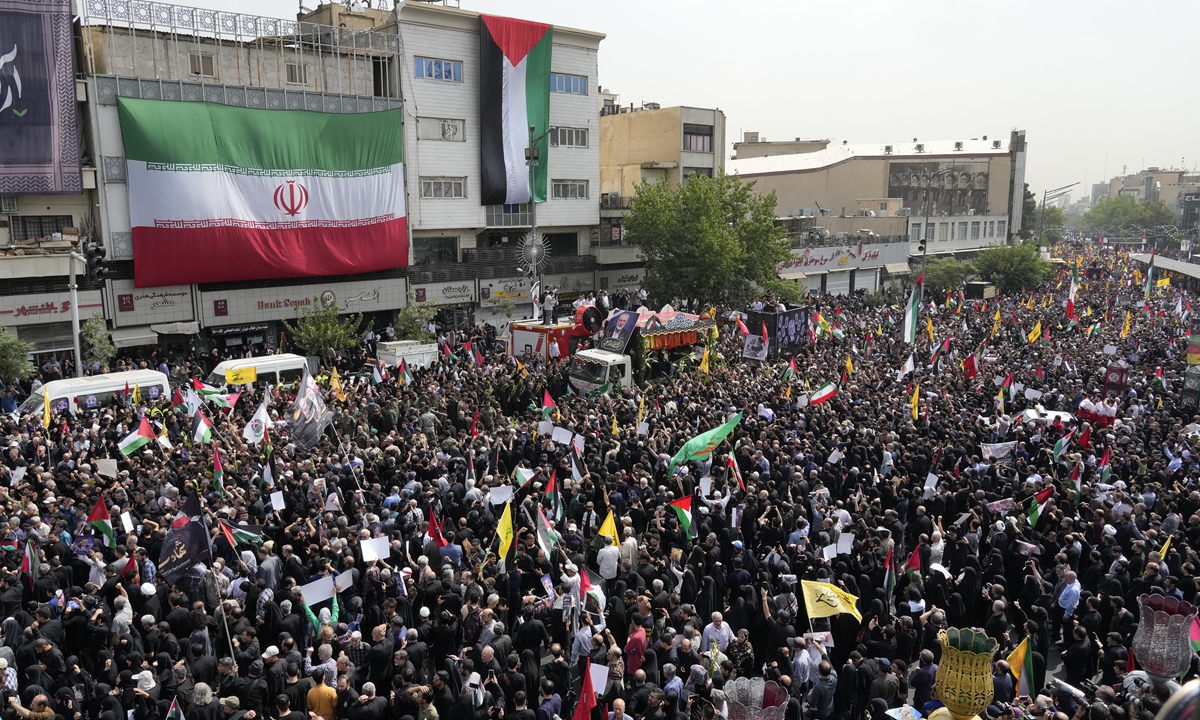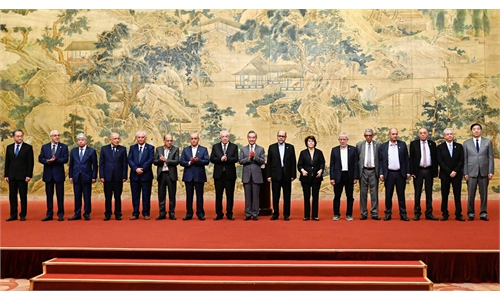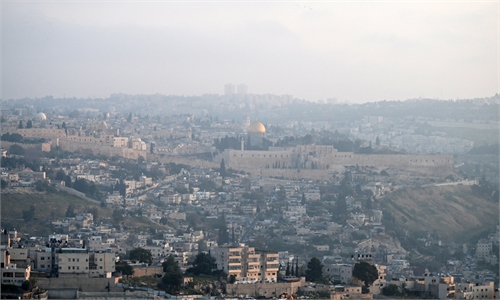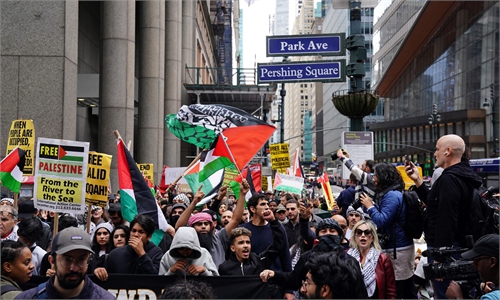Iran vows revenge for Haniyeh's death as 'Middle East teetering on brink of broader conflict'

People follow a truck carrying the coffins of Hamas' political leader Ismail Haniyeh and his bodyguard who were killed in an assassination on July 31, 2024, during their funeral ceremony in Tehran, Iran on August 1, 2024. Photo: VCG
The situation in the Middle East is again teetering on the brink of what experts described as an "escalating and volatile conflict," as Iran vowed "harsh punishment" for Israel, which it says was responsible for assassinating Hamas' political leader, Ismail Haniyeh.A large number of people gathered at the University of Tehran on Thursday morning for Haniyeh's funeral ceremony, Iran's state-run Press TV said. Iran's supreme leader, Ayatollah Ali Khamenei, led the funeral prayers for Haniyeh, according to Press TV.
In a statement on his official website, Iranian supreme leader said revenge was "our duty" and that Israel had "prepared a harsh punishment for itself" by killing "a dear guest in our home," AP reported.
Speaker of Iran's Parliament Mohammad Bagher Qalibaf said on Thursday at the funeral procession for Haniyeh at the University of Tehran that Iran considers it a duty to respond to the Israeli crime at the right time and place, according to Islamic Republic News Agency. He noted that Israel will pay a heavy price for the crime it committed in the Iranian territory.
Israel has not admitted responsibility for the attack in Tehran.
Israeli Prime Minister Benjamin Netanyahu said Israel "will exact a very heavy price from any aggression against us on any front" but did not mention the killing of Haniyeh. "There are challenging days ahead," he added.
Haniyeh was targeted and killed in an Israeli strike early Wednesday while visiting Iran after attending the inauguration of Iran's new president Masoud Pezeshkian, according to a statement released by Hamas, Al Jazeera reported. The head of Hamas' military wing, Mohammed Deif, was killed in an Israeli airstrike in Gaza last month, the Israeli military said Thursday, Reuters reported.
Israel also claimed that a Thursday strike in Beirut, Lebanon, killed Hezbollah's most senior military commander, CNN said.
Hezbollah Leader Sayyed Hassan Nasrallah will give a speech on Thursday afternoon to voice Hezbollah's political stance with regard to this attack, according to the militant group's statement issued on Wednesday.
Escalating tension
Liu Zhongmin, a professor at the Middle East Studies Institute of Shanghai International Studies University, believes the assassination of Haniyeh in Tehran partly aims to sabotage Iran's policies and arrangement in the region. However, Liu pointed out that it's too early to say Iran will march into a full-scale war with Israel. He noted that conflict between Hezbollah and Israel, however, will probably escalate.
The US State Department on Wednesday raised its travel advisory to Lebanon to level four, which says "Do Not Travel." The State Department advised Americans in Lebanon to depart if possible, according to Reuters. Several airline companies, including Air France and Turkish Airlines, halted Beirut flights due to escalating Israel-Hezbollah tensions.
"It seems like a direct retaliation against Israel, especially under the current context, is quickly approaching as Israel is already embroiled in conflicts with Hezbollah, Hamas, and other Iranian regional allies. The risk of escalating conflict in the future is very high," Wang Jin, an associate professor at the Institute of Middle Eastern Studies at Northwest University in Xi'an, told the Global Times.
Reconciliation process
UN Security Council (UNSC) held an emergency meeting on Wednesday after the assassination.
Fu Cong, China's permanent representative to the United Nations, said on Wednesday at the meeting that China firmly opposes and strongly condemns the assassination of Haniyeh. This act was a blatant attempt to sabotage peace efforts and wantonly trampled on the fundamental UN Charter principle of respect for sovereignty and territorial integrity of all states, he said.
Fu stated that China is deeply worried about an exacerbation of the upheaval in the region that this incident may trigger.
When asked if the assassination of Haniyeh will undermine Beijing's efforts to help unite Palestinian factions, Lin Jian, spokesperson of China's Ministry of Foreign Affairs, said on Thursday that China supports Palestine's internal reconciliation and believes this is an important step toward solving the Palestinian question and realizing peace and stability in the Middle East.
Lin said "China commends Palestinian factions for their effort on the Beijing Declaration, and looks forward to the day when Palestinian factions achieve reconciliation and, on that basis, realize independent statehood as early as possible. We will continue to work with relevant parties toward this goal."
"The more daunting the situation is in the Middle East, the more critical it is for the international community to try to cool down the situation and enable de-escalation. China remains committed to keeping the Middle East peaceful and stable, and opposes external interference. We stand ready to work with relevant parties to work hard for lasting peace and security in the region," Lin noted.
Last month, at China's invitation, representatives of 14 Palestinian factions, including Fatah and Hamas, held reconciliation talks and signed the Beijing Declaration on Ending Division and Strengthening Palestinian National Unity in Beijing.
China's efforts to promote reconciliation of Palestinian factions are motivated by their own aspirations. The longstanding rift between Fatah and Hamas has hindered progress toward realization of a just cause of the Palestinian people to restore their legitimate national rights, said Liu, noting that Haniyeh's assassination may complicate the reconciliation process, but it won't alter the broader trend toward internal unity in Palestine.




